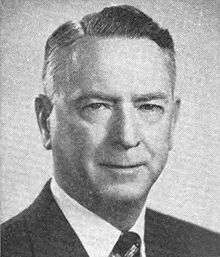Charles R. Jonas

Charles Raper Jonas (December 9, 1904 – September 28, 1988) was a U.S. Representative from North Carolina for ten terms (1953-1973). At the time of his election in 1952, he became the first Republican to represent his state in either house of the U.S. Congress since his own father, Charles A. Jonas, and George M. Pritchard left office in 1931.
Life and career
While in Congress, he served from 1954-1972 on the House Appropriations Committee at a time when the committee cut more than $93 billion from budgets proposed by four presidents, Eisenhower, Kennedy Johnson, and Nixon.
Jonas' long and pioneering service to the Republican Party in North Carolina and his efforts to make North Carolina a two-party state, earned him the nickname, "Mr. Republican." He retired in 1972 declining to run for an eleventh term. The General Assembly of North Carolina passed a joint resolution in 1991 honoring the life and member of Jonas "former Congressman and 'Mister Republican.'"
Jonas graduated from Lincolnton High School in 1921, where he was voted "Best All Around Member of his Senior Class." He graduated from the University of North Carolina with an AB degree in 1925 and a Juris Doctor with high honors in 1928. As an undergraduate, he was president of the Dialectic Society (1925) and the Monogram Club and was president of the Class of 1925. Later in law school he was student body president in 1926 and founded the school's College Republicans chapter in 1927. He was editor-in-chief of the North Carolina Law Review from 1927 to 1928 and a member of the Order of the Coif.
After graduating from law school, he entered into the law practice of his father, Charles A. Jones and the firm became Jonas and Jonas in 1928. His father had been the first Republican elected from North Carolina to serve in Congress in the twentieth century and later became a Republican candidate for the U. S. Senate.
In September 1940 he was called to active service as a member of the North Carolina National Guard. During World War II he had an extensive military career, serving in the United States Army Judge Advocate General's Corps, rising to the rank of lieutenant colonel in 1945, and in the Judge Advocate General Corps of the North Carolina National Guard as a brigadier general.
He was a member of the North Carolina Bar Association, serving as president, 1946-1957 and on the North Carolina Board of Law Examiners, 1948-1949. Earlier, from 1931-1932 he served briefly as an assistant United States Attorney for the Western District of North Carolina.
Jonas lived most of his life in Lincolnton, North Carolina. The public library in Lincolnton, North Carolina is named in his honor. There is also a federal building in Charlotte, North Carolina, and a section of North Carolina Highway 27 named after him. Highway 27 connects Charlotte to cities to its north including Jonas's hometown of Lincolnton. His home at Lincolnton, Shadow Lawn, was listed on the National Register of Historic Places in 1972.[1][2]
References
- ↑ Staff (2010-07-09). "National Register Information System". National Register of Historic Places. National Park Service.
- ↑ Survey and Planning Unit Staff (December 1971). "Shadow Lawn" (pdf). National Register of Historic Places - Nomination and Inventory. North Carolina State Historic Preservation Office. Retrieved 2015-01-01.
External links
| United States House of Representatives | ||
|---|---|---|
| Preceded by Hamilton C. Jones |
Member of the U.S. House of Representatives from North Carolina's 8th congressional district 1953-1963 |
Succeeded by Basil Whitener |
| Preceded by A. Paul Kitchin |
Member of the U.S. House of Representatives from North Carolina's 8th congressional district 1963-1969 |
Succeeded by Earl B. Ruth |